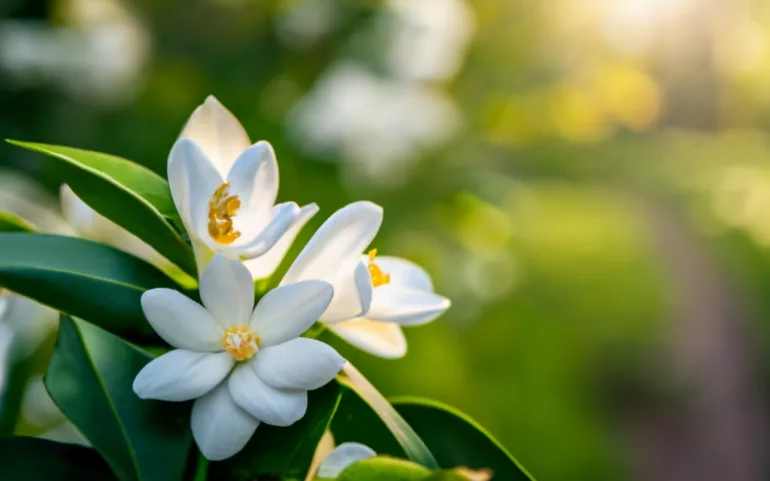The jasmine flower is instantly recognizable by its delicate petals and intoxicatingly sweet scent. But beyond its beauty and fragrance, the jasmine holds deep spiritual symbolism and significance across many cultures and religious traditions.
From Hinduism and Buddhism to Islam, Christianity, and more, the jasmine flower represents core human experiences and concepts like love, purity, life, death, and renewal. It is revered for its healing and mystical properties and commonly incorporated into meditation, rituals, ceremonies, and sacred practices.
Let’s explore the captivating spiritual meaning and uses of this botanical wonder that has enchanted people for centuries.
Symbolic Meanings of Jasmine
Purity and Innocence
The jasmine flower is strongly associated with purity and innocence in many cultures. In the Hindu religion, jasmine represents purity, transcendence, and is used as offerings to deities.
Buddhists also view the jasmine as representing the purity of one’s heart and mind. The flower’s clean, delicate fragrance evokes purity of both body and spirit.
Love and Romance
Jasmine has become synonymous with love and romance across the world. In many traditions, jasmine flowers strung together as garlands, crowns, or decorations symbolize attachment and the unity of lovers.
Newly married couples are often adorned with jasmine garlands, highlighting this flower’s meaning of sensuality, togetherness, and matrimony.
Spiritual Awakening
The sweet yet powerfully lingering aroma of jasmine flowers is believed to uplift mood, promote calmness, and encourage spiritual awakening or mystical experiences.
In Thailand, jasmine flower garlands and decorations are used to respectfully welcome and honor monks and important spiritual figures. The flower represents the divinity within humankind.
Stimulating the Senses
Jasmine essential oil, made from the extract of jasmine flowers, is used in aromatherapy and personal rituals to stimulate one’s senses. The scent targets areas of the brain connected to emotion, memory, sexual desire, and spirituality.
Jasmine incense and perfumes have also been used medicinally in Ayurveda for centuries to promote emotional well-being.
Cultural and Religious Significance
The jasmine holds important meaning and is used in the practices of several major religions and cultural traditions.
Hinduism
- Considered the ‘flower of the Gods,’ jasmine is used to make daily offerings to deities.
- Garlands made of jasmine adorn auspicious images and idols of gods and goddesses.
- The flowers are strung together as venis and used to decorate the hair of Hindu women.
Buddhism
- White jasmine flowers represent the purity and enlightenment that Buddhists strive for.
- Offerings of jasmine flowers are made at temples and on home altars.
- Jasmine tea is used as a natural aid to calm the mind during meditation.
Islam
- Muslims believe the botanical name for jasmine, jasminum , is derived from the Persian word yasmin , referencing beauty and love.
- Jasmine oil scents mosque lamps and perfumes used to anoint the bodies of the dead before burial.
- The flower’s fragrance and white color represent cleanliness and virtue.
Weddings, Celebrations, and Rituals
- Jasmine is featured heavily at weddings across Asia, particularly in bridal decorations.
- In Indonesia, jasmine-infused water is sprayed on newlyweds as a blessing.
- Jasmine garlands are central to festivals and ceremonies like welcoming spring.
Jasmine in Folklore and Mythology
The jasmine has captured imaginations for ages, appearing in myths, folktales, and legends across the world.
Arabian Nights
The fragrance of jasmine fills the pages of Arabian Nights as a symbol of beauty, love, and enchantment. Women adorn themselves with jasmine garlands and bouquets to captivate the interest of potential suitors when venturing outdoors.
Greek Mythology
In Greek myth, the jasmine plant sprouted from the blood of Adonis, the god of beauty and desire. Venetian blinder poets dubbed jasmine the “bride of the day” for the way its petals open wide in daylight and close modestly at dusk.
Persian Culture
Ancient Persians saw the jasmine flower as a representation of the divine light of God present in all living things.
Indian Folklore
Indian folktales say the jasmine plant first sprouted from the ground where the Hindu god Vishnu had taken his fifth reincarnation as Vamana.
Symbol of Beauty
Across folklore, myths, and literature from various cultures, jasmine consistently appears as an enduring symbol of elegance, femininity, transient beauty, and the sweetness of youth.
Practical Applications of Jasmine
Beyond symbolic meanings, the jasmine flower and essential oils extracted from it are widely used in spiritual practices, rituals, traditional medicine, and more.
Spiritual Aid
- Burning jasmine incense is thought to help stimulate the pineal gland and enhance intuition.
- Meditating while inhaling jasmine essential oil promotes relaxation.
- Placing fresh jasmine flowers on a home altar can amplify prayers.
Traditional and Ayurvedic Medicine
- Jasmine tea made from dried jasmine flowers and buds acts as a sedative, reducing anxiety.
- Jasmine oil is applied topically to treat dry, irritated, or sensitive skin.
- The essential oil treats headaches, depression, and childbirth pain.
Personal Rituals
- Adding jasmine flowers or oil to a spiritual bath or anointing oil helps cleanse the energy of the user.
- Including jasmine in dream pillows, dream incense, or tea enhances one’s dreams.
- Carrying or wearing jasmine flowers brings about confidence and grace.
Jasmine in Sacred Rituals
The jasmine flower plays an important role in rituals, ceremonies, and celebrations across several cultures and faiths.
Purification
- In Southeast Asia, jasmine flowers and water are used for cleansing, purification, and welcoming rituals.
- Hindu rituals use jasmine garlands and oils to purify offerings to the gods.
Blessings
- Buddhist monks bless devotees by sprinkling jasmine-infused water.
- Hindu priests adorn infants with jasmine chains and wristlets to bring blessings and prosperity.
Weddings
- Indian brides have jasmine woven into their hair and wear jasmine garlands as symbols of hope, purity, fertility, and auspiciousness.
- In Indonesia, a mother will wash the bride’s hair with jasmine-infused water on the morning of the wedding.
Death Rituals
- Jasmine incense is burned at Hindu funerals to guide the soul into the next realm.
- Muslims often scent funeral shrouds with perfumes containing jasmine.
Other Ceremonies
- Jasmine garlands are central to celebratory processions like the Indian festival of Onam.
- Jasmine flowers decorate Philippine churches at annual Flores de Mayo festivals.
Mystical Properties of Jasmine
Beyond its rich symbolic meanings, jasmine is also believed to possess mystical and magical properties that spiritual practitioners utilize.
Dream Enhancement
- Placing jasmine flowers or oil near one’s pillow is thought to produce vivid, prophetic dreams.
- Jasmine tea drank before bed helps relax the body and activate the imagination.
Divination
- In the language of flowers, a jasmine bouquet received from an admirer represents attraction.
- If the flowers wilt quickly, it may be a sign that the affection is fleeting.
Healing
- Jasmine essential oil stimulates the circulatory system and promotes emotional well-being and optimism.
- Ayurvedic practitioners apply jasmine oil to balance hormones and heal reproductive health issues.
Energy Clearing
- Jasmine incense smoke or essential oil is used in Vastu shastra to remove stagnant energy from spaces.
- Carrying jasmine flowers on your person purifies thoughts and provides clarity.
Crown Chakra Activation
- The sweet aroma of jasmine opens, aligns, and energizes the crown chakra, which governs spirituality.
- Adding jasmine to meditation spaces aids in attaining a transcendental state of being.
The Essence of Jasmine Symbolism
What makes the jasmine flower so transcendent and revered across cultures? Let’s summarize the core symbolic meanings behind this captivating flower.
- Purity – The bright white petals and cleansing scent represent innocence, modesty, and pureness of body, mind, and spirit.
- Love – The emotionally stimulating fragrance signifies romance, unity, divine intimacy, and is considered an aphrodisiac.
- Life – The blossoms’ ephemeral nature embodies renewal, fleeting beauty, and the soul’s journey.
- Death – In funerary and burial rituals, jasmine represents the transition between life, death, and rebirth.
- Femininity – The delicately beautiful blooms are associated with grace, charm, femininity, and new brides.
- Divinity – Jasmine is the flower of the gods, representing spiritual awakening, mysticism, and the spark of the divine in humanity.
- Healing – Medicinal properties treat emotional and physical ailments to bring about holistic wellbeing.
- Dreams – Jasmine stimulates fantasy, imagination, senses, and visionary sleep states.
Conclusion: The Profound Power of Jasmine
The jasmine flower, with its enchantingly sweet fragrance and delicate beauty, has captivated people for centuries and holds a special place in many cultures and traditions. Beyond its aesthetic appeal, jasmine possesses a deep spiritual symbolism, representing core aspects of human experience – love, joy, beauty, dreaming, and the eternal cycle of life.
Revered for its healing and mystical properties, this botanical wonder enriches spiritual practices, rituals, and ceremonies. When we take a moment to appreciate the grace of the jasmine, we allow its magic to awaken our senses, inspire hope and devotion, and connect us to worlds both sacred and sublime.
So the next time you encounter the jasmine flower, consider all its profound layers of meaning that have made it beloved across civilizations. Let its delicate petals and soothing aroma transport you, even for just an instant, to the divine.




